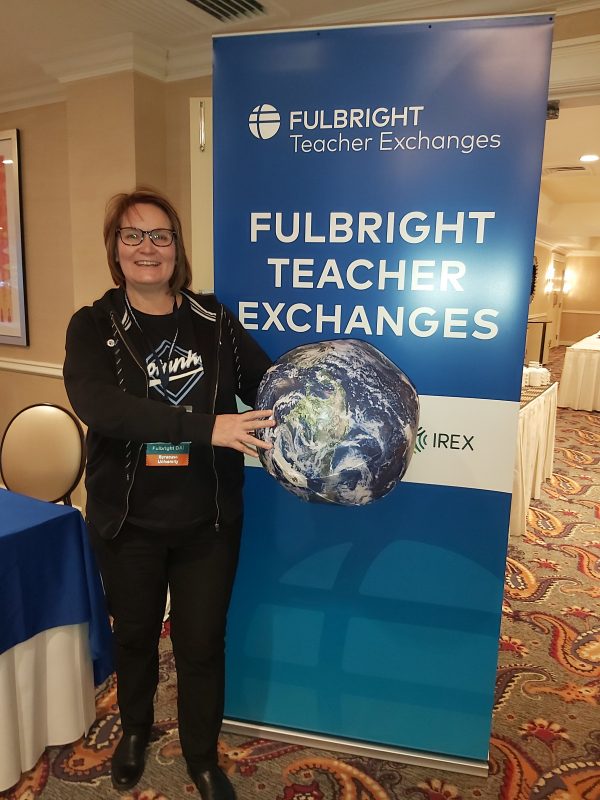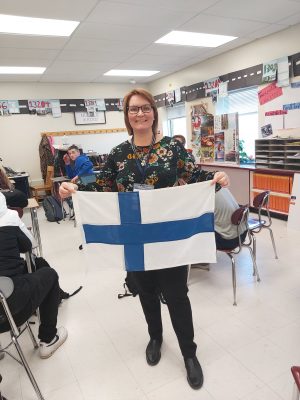Curiosity about her home country impressed Tuija Kae, a high school English teacher from Finland, when she was in her field placement at East Syracuse Minoa High School earlier this semester.
She presented to ESM students about Finland and its education system, “I was very pleasantly surprised by their interest and inquisitiveness,” she says. “Finnish students are much more quiet and shy and would not be so ready to ask questions in clasotss.”

Kae is one of the 16 recipients of the Fulbright Distinguished Award in Teaching Program for International Teachers (DAI), who spent the first half of the semester in the School of Education, when the COVID-19 situation required everyone to return home. For more than 20 years she has taught at Sotunki Upper Secondary School in Vantaa, Finland, where she is a senior teacher of English, vice principal and coordinator of international activities.
Having previously visited the United States as an exchange student at West Chester University of Pennsylvania, Kae was prepared for the American culture and says she’s grateful for “the friendliness and helpfulness of Americans.”
She says the Fulbright DAI program had been her “dream for a long time,” and she was “ having a great time in Syracuse,” so returning home mid-semester was very disappointing.
While in Syracuse, she observed classes in English as a new language, English, Spanish, French, global studies, life science, art and music theory. Her impressions of suburban American high school were enthusiastic.
“The teachers are very professional and talented,” Kae says. “The students were well-motivated and polite. ESM has a very positive and pleasant school atmosphere.”
“The teachers opened their classrooms to me and included me in their classes in different ways,” she says. “I talked about the Cold War from a Finnish perspective, interviewed students on their projects and listened to their presentations.”
The lack of standardized testing and the national funding of education are two of the big differences between the Finnish and American education systems. Compulsory education in Finland runs from preschool through year nine. The only nationwide standardized test is the matriculation examination taken at the end of secondary education to qualify for entry into a university, Kae says.
Finnish teachers have annual career development discussions with the school principal but no other assessment. Schools are nationally funded, based on the number of students; Finland does not have private schools. School lunches are free to all from preschool to the end of secondary education, and even higher education is free.
 American students would be surprised at the difference in applying to Finnish universities, Kae says. “The selection process is fully transparent, merit-based and objective. There are no application essays and no weight on extracurricular activities when you apply to university.”
American students would be surprised at the difference in applying to Finnish universities, Kae says. “The selection process is fully transparent, merit-based and objective. There are no application essays and no weight on extracurricular activities when you apply to university.”
In Finland, Kae calls herself a pioneer in developing and teaching distance learning courses. She has co-written eight upper secondary school English textbooks for a Finnish publishing house and is a co-founder of EduBorealis, which provides educational services to educational institutions and private companies. At EduBorealis, she develops Erasmus+ teacher training courses.
Her affinity for online and distance learning is serving her well, given the unprecedented turn the semester took just before spring break. From Finland she continues to audit two SOE classes, Instructional Design and Development II, and Collaborative Teaching for Inclusive Education. Her Fulbright DAI inquiry project is to design an online American culture course for the Adult Education Center in Vantaa.
“My class on Instructional Design has provided new insights into planning online courses, and I will share the information with my colleagues back in Finland,” she says. “The online American culture course will hopefully be available for students next school year.”
At East Syracuse Minoa, “I have been able to observe various interesting teaching methods and student-centered classroom activities that I will incorporate in my own classroom in the future.”
Among the events of a very memorable semester, Kae says she’ll look back happily on two outings with Fulbright DAI cohort that happened in the Dome, the men’s basketball game against Pittsburgh that Syracuse won, 69-60, and the Rev. Dr. Martin Luther King Celebration.
Also memorable for this visitor to the snowiest major city in the United States was the day in early February when the University canceled classes after a heavy snowfall.
“In Finland we never close schools due to weather, so closing schools for snowfall was a new experience for me,” Kae says.
This semester has forced everyone into adapting to change, making adjustments, and accepting disappointment. Kae says it was difficult to adjust to life at home in quarantine conditions, “but at least we have all stayed healthy.” She says she misses her Fulbright cohort, and their time in Syracuse. “We stay connected via WhatsApp and Zoom,” she says, “and hopefully we’ll be able to meet somewhere in the future.”
